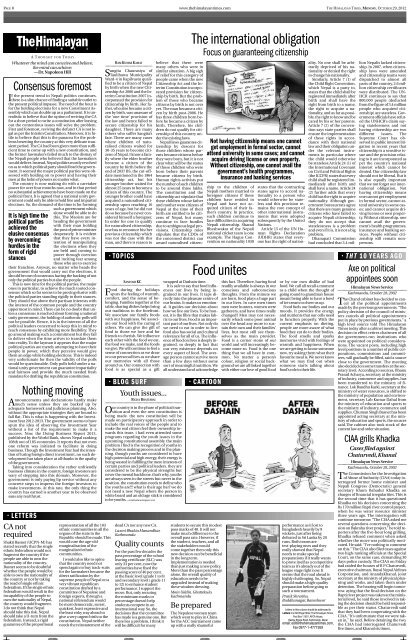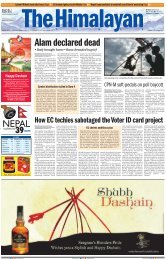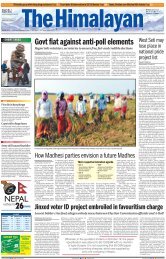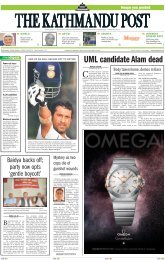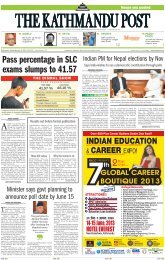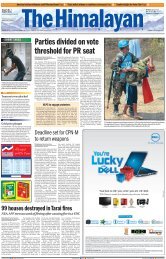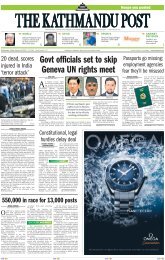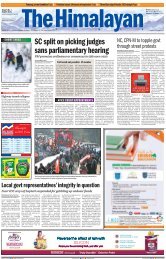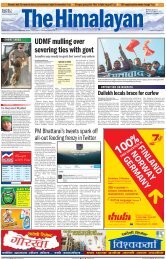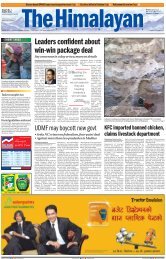Forget CA revival, Prez tells parties
Forget CA revival, Prez tells parties
Forget CA revival, Prez tells parties
Create successful ePaper yourself
Turn your PDF publications into a flip-book with our unique Google optimized e-Paper software.
PAGE 8 www.thehimalayantimes.com<br />
TheHimalayan<br />
T I M E S<br />
A THOUGHT FOR T ODAY<br />
Whatever the mind can conceive and believe,<br />
the mind can achieve.<br />
—Dr. Napoleon Hill<br />
Consensus foremost<br />
If the present trend in Nepali politics continues,<br />
there is a slim chance of finding a suitable outlet to<br />
the present political impasse. The need of the hour is<br />
for the holding elections for a new Constituent Assembly<br />
which can double up as a parliament. It is unrealistic<br />
to believe that the option of reviving the <strong>CA</strong><br />
for a short period to write a constitution after leaving<br />
out the contentious issues will solve the problem.<br />
First and foremost, reviving the defunct <strong>CA</strong> is not legal<br />
as per the Interim Constitution. Moreover, it is futile<br />
to believe that this is the panacea for the problems<br />
besetting the country at this very delicate transient<br />
period. The <strong>CA</strong> had been given more than sufficient<br />
time to come up with a new constitution, and<br />
the former lawmakers failed much to the dismay of<br />
the Nepali people who believed that the lawmakers<br />
would deliver. Instead, Nepal politics mostly revolved<br />
on as to which political party should lead the government.<br />
It seemed the major political <strong>parties</strong> were obsessed<br />
with holding on to power and having their<br />
men at the helm of powers no matter what.<br />
The country is now making do with a caretaker<br />
power for over four months now, and in that period<br />
no substantial achievements have been made on the<br />
political front. It is agreed that a national unity government<br />
could only be able to hold free and impartial<br />
elections. So, the demand of the time is for forming<br />
such a government which<br />
alone would be able to do<br />
It is high time the this. The Maoists are for<br />
political <strong>parties</strong> heading the government<br />
with their man holding<br />
achieved the the post of prime minister<br />
elusive consensus desperately. It is evident<br />
that they have every in-<br />
by overcoming tention of manipulating<br />
hurdles in the the elections when they<br />
are held and coming to<br />
form of rigid<br />
power through coercion<br />
stances<br />
and inciting fear among<br />
those who are to exercise<br />
their franchise. Anyway, no matter who heads the<br />
government that would carry out the elections, it<br />
should be one of consensus having the backing of not<br />
only the political <strong>parties</strong> but also the people.<br />
This is now time for the political <strong>parties</strong>, the major<br />
ones in particular, to achieve the much touted consensus<br />
which so far seems to be proving elusive with<br />
the political <strong>parties</strong> standing rigidly to their stances.<br />
They should rise above their partisan interests with<br />
the interest of the common people and the country<br />
uppermost in mind. There can be no doubt that unless<br />
a consensus is reached about forming a national<br />
unity government, the holding of authentic polls will<br />
not be possible. Hence, it is in the interest of all the<br />
political leaders concerned to keep this in mind to<br />
reach consensus by exhibiting more flexibility. They<br />
go around making such a commitment but they fail<br />
to deliver when the time arrives to translate them<br />
into reality. To the layman it appears that the major<br />
political <strong>parties</strong> are merely attempting to have their<br />
people in power, which they perceive would give<br />
them an edge while holding elections. This is indeed<br />
very unfortunate for then the validity of the polls<br />
would be questionable. Only polls held under a national<br />
unity government can guarantee impartiality<br />
and fairness and provide the much needed fresh<br />
mandate for drafting the republican constitution.<br />
Nothing moving<br />
Announcements and declarations hardly make<br />
much sense unless they are backed up by<br />
adequate homework and judicious planning. Also,<br />
without the appropriate strategies they are bound to<br />
fall flat. This is what is happening with the Investment<br />
Year 2012-2013. The government seems to have<br />
spun the idea of observing the Investment Year<br />
without a list of the requirement to make it a<br />
success. Now, the Doing Business Report 2013,<br />
published by the World Bank, shows Nepal ranking<br />
108th out of 185 economies. It reports that not even<br />
one reform was initiated to facilitate in doing<br />
business. Though the Investment Year had the intention<br />
of luring foreign direct investment, no such development<br />
has taken place at all thanks to the apathy<br />
of the government.<br />
Taking into consideration the rather unfriendly<br />
business climate in the country, foreign investors are<br />
wary of stepping into this domain. Moreover, the<br />
government is only paying lip service without any<br />
concrete steps to impress the foreign investors to<br />
make investments. At this rate, the only thing the<br />
country has earned is another year to be observed<br />
sans any real thrust.<br />
• LETTERS<br />
<strong>CA</strong> not<br />
required<br />
Shakti Basnet (UCPN-M) has<br />
stated recently that the single<br />
ethnic federalism would not<br />
fragment the country if the<br />
people are able to own the<br />
nationality of the country.<br />
Basnet seems to be doubtful<br />
whether the people would be<br />
able to own the nationality of<br />
the country or not by taking<br />
the road of single ethnic<br />
federalism. If the single ethnic<br />
federalism would result in the<br />
incapability of the people to<br />
own the nationality of Nepal,<br />
the country would fragment.<br />
I do not think that Nepal<br />
should take this risk. Nepal<br />
should take a U-turn from the<br />
federalism. Instead, a rigid<br />
guarantee of the proportional<br />
representation of all the 103<br />
ethnic communities in all the<br />
organs of the state in the<br />
Republic should be made. This<br />
would cure the age-old<br />
marginalization of the<br />
marginalized ethnic<br />
communities.<br />
I would also like to opine<br />
that the country need not<br />
spend again to buy track-suits<br />
for the lawmakers because the<br />
direct ratification by the<br />
supreme people of Nepal on a<br />
very vibrant republican<br />
constitution drafted by a<br />
committee of Nepalese and<br />
foreign experts, through a<br />
national referendum would<br />
be most democratic, surest,<br />
quickest, least expensive and<br />
the least risky way ahead to<br />
give a very urgent birth to the<br />
constitution. Nepal neither<br />
needs the reinstatement of the<br />
RAM KUMAR KAMAT<br />
Sangita Chaurasiya of<br />
Taulihawa Municipality<br />
Ward-4 in Kapilvastu qualified<br />
to be a citizen of Nepal<br />
by birth when the new Citizenship<br />
Act 2006 and the Interim<br />
Constitution 2007 incorporated<br />
the provision for<br />
citizenship by birth. Her father,<br />
who also became a citizen<br />
by birth, was unaware of<br />
the ‘one time’ provision of<br />
the law and hence failed to<br />
secure citizenship for his<br />
daughter. There are many<br />
others who suffer Sangita’s<br />
fate. There are many cases<br />
where children of naturalised<br />
citizens waited for<br />
30-35 years to become citizens<br />
of Nepal. I know a family<br />
where the elder brother<br />
became a citizen of the<br />
country by birth before the<br />
end of 2037 BS, the cut-offdate<br />
mentioned in the 1964<br />
citizenship act, but his<br />
younger brother waited for<br />
almost 25 years to become a<br />
citizen of this country. The<br />
younger brother could have<br />
acquired a naturalised citizenship<br />
upon reaching 16<br />
years of age, but he did not<br />
do so because he never considered<br />
himself a foreigner.<br />
In order for one to qualify<br />
for naturalised citizenship,<br />
one has to renounce his/her<br />
previous citizenship which<br />
was not the case with this<br />
man, and there is reason to<br />
• TOPICS<br />
SANTOSH KC<br />
Food during the holidays<br />
spurs the feeling of warmth,<br />
comfort, and the sense of belonging.<br />
Families together at the<br />
table, sharing dishes helps bring<br />
out traditions to the forefront.<br />
We associate our family foods<br />
with our happiness. We associate<br />
our food with the caring of<br />
others. We can give the gift of<br />
food to those we love and for<br />
friends to cherish. We influence<br />
each other with the food we eat,<br />
the food we make, and the foods<br />
we give. We will continue to feel a<br />
sense of connection as we draw<br />
on our personal lives as we share<br />
our memories with all those<br />
around us. Our connection with<br />
food is as special as a gift<br />
dead <strong>CA</strong> nor any new <strong>CA</strong>.<br />
Laxmi Bhakta Manandhar,<br />
Kathmandu<br />
Quality counts<br />
For the past few decades the<br />
pass percentage of the school<br />
leaving certificate (SLC) was<br />
only 33 per cent, now the<br />
authorities have fixed the<br />
passing score of 40 per cent.<br />
at the basic level (grade 1 to 8)<br />
and secondary level ( grade 11<br />
to 12) to enhance student<br />
performance. I support the<br />
move. But, only securing<br />
the minimum marks or<br />
percentage doesn’t help<br />
students compete in an<br />
international way. So, the<br />
decisions that the committee<br />
has made is a genuine one. But<br />
there lies a problem, I think it<br />
will be difficult for many<br />
believe that there were<br />
many others who were in<br />
similar situation. A big sigh<br />
of relief for this category of<br />
people came when the new<br />
Citizenship Act and the Interim<br />
Constitution incorporated<br />
provision for citizenship<br />
by birth. But the problem<br />
of those who became<br />
citizens by birth is not over<br />
yet. The man became a citizen<br />
by birth post-2006. He<br />
has three children born before<br />
he became a citizen by<br />
birth. Therefore, his children<br />
do not qualify for citizenship<br />
of this country under<br />
the existing laws.<br />
Nepali laws guarantee citizenship<br />
by descent for<br />
those children whose parents<br />
became citizens before<br />
they were born, but it is not<br />
clear what will be the status<br />
of those children who were<br />
born before their parents<br />
became citizens by birth.<br />
Human rights activists put<br />
the number of such children<br />
to be around three lakhs.<br />
The constitution and the<br />
citizenship act stipulate that<br />
these children whose father<br />
and mother were citizens of<br />
Nepal at the time of their<br />
birth are entitled to be citizens<br />
of Nepal, but many<br />
continue to face hurdles<br />
due to ambiguous legal provisions.<br />
Citizenship rules<br />
stipulate that the CDOs of<br />
the concerned district can<br />
award naturalised citizen-<br />
wrapped at Dashain time.<br />
It is safe to say that food influences<br />
our lives by being ingrained<br />
in our lives. It taps directly<br />
into the pleasure centre of<br />
our brains. It makes us emotional.<br />
It guides our decision about<br />
how we live our lives. To be honest,<br />
it is the fibre that makes fabric<br />
to our lives. Food is an important<br />
part of our lives. Not only do<br />
we need to eat in order to live:<br />
food also has social and cultural<br />
relevance for all of us. The influence<br />
of food on lives is deeply ingrained,<br />
so deeply in fact that<br />
our very existence depends on<br />
every aspect of food. The average<br />
person cannot survive more<br />
than a few days without some<br />
sort of meaningful nutrition. We<br />
all understand and acknowledge<br />
Food unites<br />
• BLOG SURF • <strong>CA</strong>RTOON<br />
Youth issues...<br />
RICHA BHATTARAI<br />
Our country is in the phase of political transition<br />
and even the new constitution is<br />
being made. the new constitution will be<br />
made on participatory approach in order to<br />
include the real voices of the people and to<br />
make the real citizen feel their ownership towards<br />
this issue. i had even attended some<br />
programs regarding the youth issues in the<br />
upcoming constitutional assembly. the main<br />
problem i find is the recognition of youths in<br />
the decision making process and in the planning.<br />
though youths are considered to have<br />
high potential and high energy, their energy is<br />
being wasted in fulfilling the mere interests of<br />
certain <strong>parties</strong> and political leaders. they are<br />
considered to be the physical strengths but<br />
never the mental backbone. that’s why, youths<br />
are always seen in the streets but never in the<br />
position. the constitution needs to define who<br />
the youths are!!! what is their age bar? we do<br />
not need a new Nepal where the person in<br />
white beard and an old age stick is considered<br />
to be youths.—richabhattarai.blogspot.com<br />
The international obligation<br />
Focus on guaranteeing citizenship<br />
students to secure this modest<br />
pass marks of 40. It will not<br />
make much difference to the<br />
overall pass rate. However, if<br />
the student, teachers, and all<br />
the stakeholders would<br />
come together then only this<br />
new decision can be beneficial<br />
in the long term.<br />
Implementation is needed<br />
than just making a new policy.<br />
More than the pass percentage<br />
alone, the overall quality of<br />
education needs to be<br />
upgraded instead of making<br />
these window dressing.<br />
Moin Uddin. Ghattekulo,<br />
Kathmandu<br />
Be prepared<br />
The Nepalese women team<br />
which went to play in China<br />
for the ACC tournament came<br />
up with a really shameful<br />
Not having citizenship means one cannot<br />
get employment in formal sector, cannot<br />
attend university in some cases; and cannot<br />
acquire driving license or own property.<br />
Without citizenship, one cannot avail the<br />
government’s health programmes,<br />
insurance and banking services<br />
ship to the children of<br />
Nepali mothers married to<br />
foreigner citizens if these<br />
children have resided in<br />
Nepal and have not acquired<br />
citizen of their father’s<br />
country. In practice,<br />
such children continue to<br />
face difficulties in acquiring<br />
Nepali citizenship. Sharad<br />
Bheshwakar of the Nepali<br />
national cricket team is one<br />
example. The Hague Convention<br />
on nationality 1930<br />
this fact. Therefore, having food<br />
readily available is always in our<br />
conscious and subconscious<br />
thoughts. From the minute we<br />
are born, food plays a huge part<br />
in our lives. In cave men times<br />
men were hunters, women were<br />
gatherers, and have times really<br />
changed? Men may not necessarily<br />
whack some poor animal<br />
over the head any more to sustain<br />
their own and their families’<br />
lives, but most still see themselves<br />
as the main provider.<br />
Food is a corner stone of our<br />
world and will increasingly become<br />
more so. Food is the one<br />
thing that we all have in common.<br />
No matter a person’s<br />
colour, religion or social background<br />
we are all linked together<br />
with either our love of good food<br />
states that the contracting<br />
states agree to accord nationality<br />
to a person who<br />
would otherwise be stateless<br />
and this provision remains<br />
the core concept of<br />
other international instruments<br />
that were adopted<br />
subsequently by the United<br />
Nations.<br />
Article 15 of the UN Human<br />
Rights Declaration<br />
(UDHR) states that everyone<br />
has the right of nation-<br />
or by our own dislike of bad<br />
food. We call all recall a moment<br />
as a child when the thought of<br />
going round to grandma’s house<br />
meant being able to have a bowl<br />
of ice cream to cheer us up.<br />
Food fuels our bodies and our<br />
moods. It provides the energy<br />
and nutrients that our cells need<br />
to function properly. With the<br />
current emphasis on dieting,<br />
people are more aware of what<br />
food they eat do to their bodies.<br />
The food smells and sparks<br />
memories vivid with feelings of<br />
warmth and happiness. When<br />
we are getting to know someone<br />
new, try asking them what their<br />
favourite meal is. We never know<br />
what we may find out when<br />
someone starts talking about<br />
food’s role in their life.<br />
performance as it lost to<br />
Bangladesh heavily by 9<br />
wickets, just after being<br />
defeated to Sri Lanka by 20<br />
runs. Both teams are<br />
test-playing ones and they<br />
really showed that Nepal<br />
needs to make special<br />
preparations if it really wants<br />
to prove itself as a competitive<br />
team as it’s already out of the<br />
league stage right now. It<br />
seems that the road ahead is<br />
highly challenging. So, Nepal<br />
should make a high-quality<br />
preparation before going to<br />
such a tournament.<br />
Pratik Shrestha,<br />
Buddhanagar, Baneshwor<br />
THE HIMALAYAN TIMES, MONDAY, OCTOBER 29, 2012<br />
ality. No one shall be arbitrarily<br />
deprived of his nationality<br />
or denied the right<br />
to change his nationality.<br />
Similarly, Article 7 (1) of<br />
the Child Right Convention,<br />
which Nepal is a party to,<br />
states that the child shall be<br />
registered immediately after<br />
birth and shall have the<br />
right from birth to a name,<br />
the right to acquire a nationality,<br />
and as far as possible,<br />
the right to know and be<br />
cared by his or her parents.<br />
Article 7 (2) of the convention<br />
says state <strong>parties</strong> shall<br />
ensure the implementation<br />
of these rights in accordance<br />
with their national<br />
law and their obligation under<br />
the relevant instruments<br />
in particular where<br />
the child would otherwise<br />
be stateless.Article 24 (1) of<br />
the International Covenant<br />
on Civil and Political Rights<br />
(the ICCPR) states that every<br />
child shall be registered immediately<br />
after birth and<br />
shall have a name. Article 24<br />
(2) further adds that every<br />
child has the right to acquire<br />
nationality. Although government<br />
bureaucrats agree<br />
that there are many genuine<br />
citizens who have failed to<br />
acquire Nepali citizenship,<br />
they do not accept that<br />
statelessness is a problem<br />
and even if it is, it is not a big<br />
problem.<br />
Dhanapati Commission<br />
had concluded that 3.4 mil-<br />
Letters to this column should be addressed to<br />
Letters C/o Edit Page Editor,The Himalayan Times,<br />
Post Box 11651,AP<strong>CA</strong> House,<br />
Baidya Khana Road, Kathmandu, Nepal<br />
email: edit@thehimalayantimes.com,<br />
Fax 0977-1-4771959<br />
lion Nepalis lacked citizenship.<br />
In 2007, when citizenship<br />
laws were amended<br />
and citizenship teams were<br />
dispatched to almost all<br />
parts of the country, 2.6 million<br />
citizenship certificates<br />
were distributed. The UN-<br />
HCR continues to say that<br />
800,000 people (deducted<br />
from the figure of 3.4 million<br />
people who acquired citizenship)<br />
are stateless. Government<br />
officials have refuted<br />
the UNHCR’s claim saying<br />
statelessness and not<br />
having citizenship are two<br />
different issues. The<br />
Supreme Court has observed<br />
in public interest litigation<br />
in recent years that<br />
citizenship is a sensitive issue<br />
and the provision relating<br />
to it are incorporated as<br />
per the country’s national<br />
interest which cannot be<br />
denied. Our citizenship law<br />
should not be liberal. But it<br />
is also equally important<br />
that we not forget our international<br />
obligation. Not<br />
having citizenship means<br />
one cannot get employment<br />
in formal sector, cannot attend<br />
university in some cases;<br />
and cannot acquire driving<br />
license or own property.<br />
Without citizenship, one<br />
cannot avail the government’s<br />
health programmes,<br />
insurance and banking services.<br />
People without citizenship<br />
will remain nonpersons.<br />
• THT 10 YEARS AGO<br />
Axe on political<br />
appointees soon<br />
Himalayan News Service<br />
Kathmandu, October 28, 2002<br />
The Chand cabinet has decided to cancel<br />
all the political appointments<br />
made by the previous governments. “The<br />
policy decision of the council of ministers<br />
cancels all political appointments<br />
put in place by previous governments,” a<br />
high level source told The Himalayan<br />
Times today after a cabinet meeting. This<br />
decision in effect retires chairmen of all<br />
the government-run institutions who<br />
were appointed on political considerations.<br />
The vacant posts, including high<br />
level positions in a number of public corporations,<br />
commissions and committees,<br />
will gradually be filled, said a source<br />
close to the government. The meeting<br />
also decided on some transfers at the secretary<br />
level. According to sources, Bhanu<br />
Prasad Acharya, secretary at the ministry<br />
of industry, commerce and supplies, has<br />
been transferred to the ministry of finance.<br />
Lok Bandhu Karki, secretary at the<br />
ministry of water resources, is shifted to<br />
the ministry of population and environment,<br />
secretary Lab Kumar Dahal from<br />
the ministry of education and sports to<br />
the ministry of industry, commerce and<br />
supplies. Chuman Singh Basnet has been<br />
appointed acting secretary at the ministry<br />
of education and sports, the sources<br />
said.The cabinet also took stock of the<br />
current law and order situation.<br />
CIAA grills Khadka<br />
Cases filed against<br />
Chaturvedi,Khanal<br />
Himalayan News Service<br />
Kathmandu, October 28, 2002<br />
The Commission for the Investigation<br />
of Abuse of Authority (CIAA) today interrogated<br />
former home minister and<br />
Nepali Congress (Democratic) general<br />
secretary Khum Bahadur Khadka on<br />
charges of financial irregularities. This is<br />
the second time that it has questioned<br />
Khadka on his decision concerning the<br />
Rs 170 million Rapti river control project,<br />
when he was water resource minister<br />
three years ago. The interrogation will<br />
continue tomorrow. “The CIAA asked me<br />
several questions concerning the decision<br />
on Bakraha river project,” he told reporters<br />
after the five-hour long grilling.<br />
Khadka refused comment when asked<br />
whether the move was politically motivated.<br />
He said: “I’ve nothing to comment<br />
on this.” The CIAA also filed cases against<br />
two high-ranking officials at the Special<br />
Court, on the same case, demanding 30<br />
days police custody. The CIAA on Friday<br />
had raided the houses of R P Chaturvedi,<br />
executive chairman, Royal Nepal Airlines<br />
Corporation, and AnandaKhanal, joint<br />
secretary at the ministry of physical planning<br />
and works, and taken them under<br />
detention. The hearing will begin tomorrow.<br />
aying that the final decision on the<br />
Rapti river project was taken at the ministerial<br />
level, he said those involved in taking<br />
the decision should be held responsible<br />
as per their status. Chaturvedi said<br />
that they had been cooperating with the<br />
CIAA. “It’s unfortunate that we were taken<br />
in,” he said. Before detaining the two,<br />
the CIAA had interrogated Chaturvedi<br />
five times, and Khanal six times.


